![]()
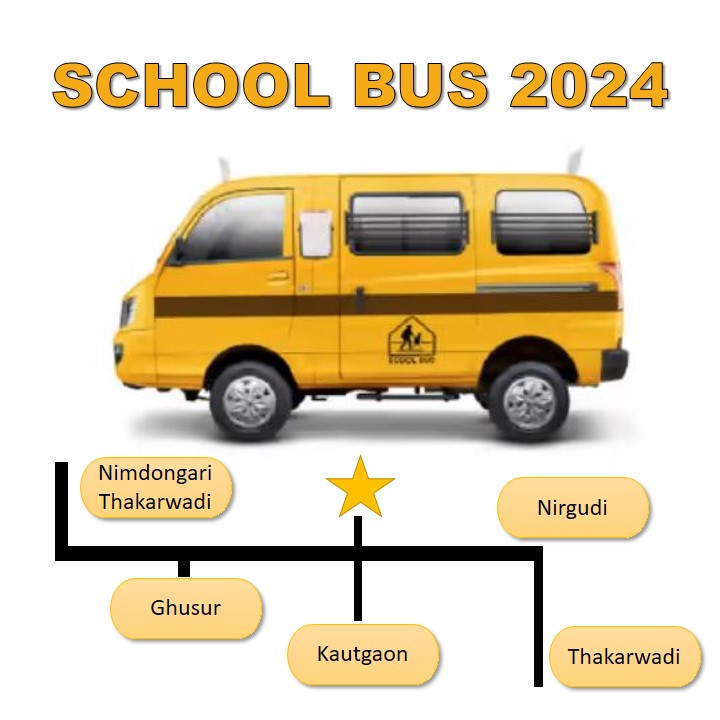
![]()
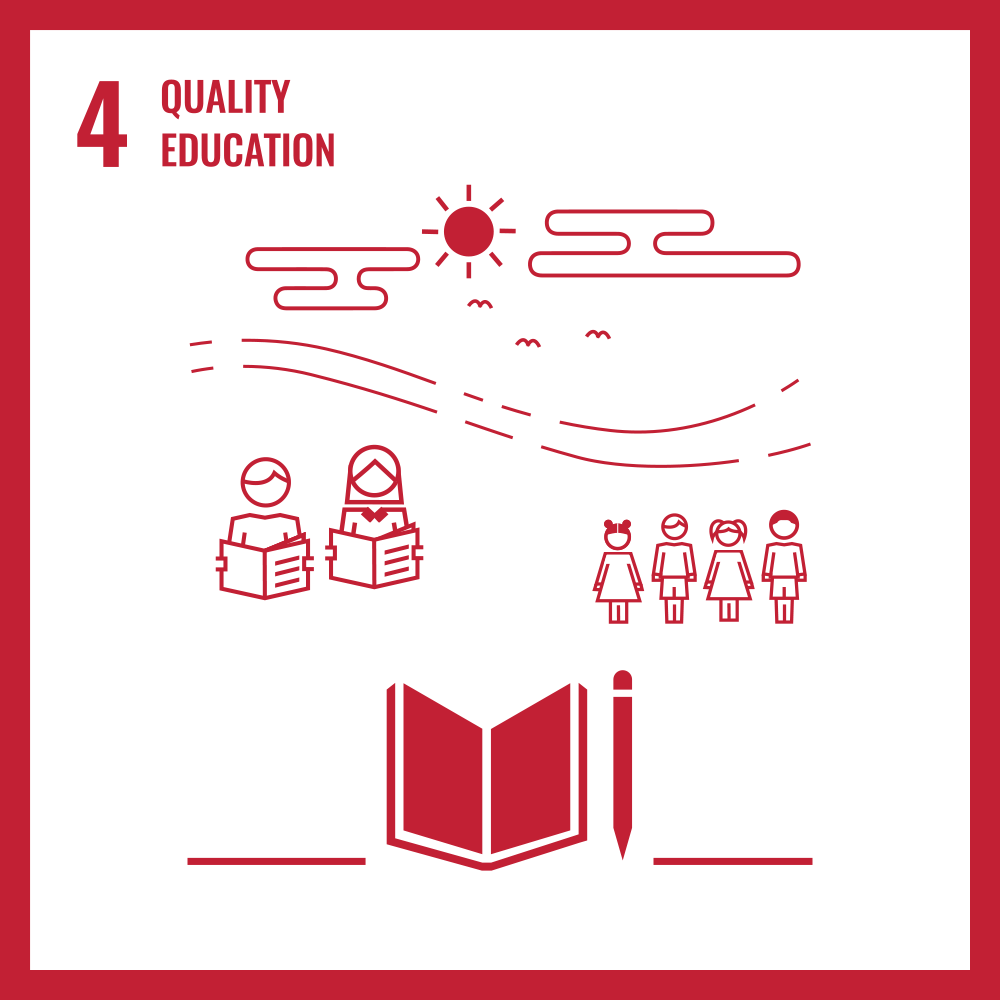
Aim : To provide transport facility to Tribal students
Objective :
• Reaching out to needy scholars
• Overcoming Geographic Challenges
• Ensuring Regular Attendance
• Community Empowerment
Stakeholders :
• Tribal students from poor landless families located at post Nirgudi-thakarwadi, Nirgudi, Ghusur, Ghusur tanda, Nimdongari-thakarwadi, Kautgaon, Tq. Khultabad. Dist. Chatrapati Sambhaji Nagar. (Formerly Dist. Aurangabad)
Beneficiaries :
• Primary and secondary school students from age group 8 years to 16 years
Methodology :
The distance to travel has a big adverse impact on the educational lives of rural students. If there is a school bus to pick up and drop off every day, it will create a benefit in the sense of saving time and effort.
Implementation :
• Started on 13 June 2024
• Rent a school bus and school van for 3 different routes covering 5 remote villages
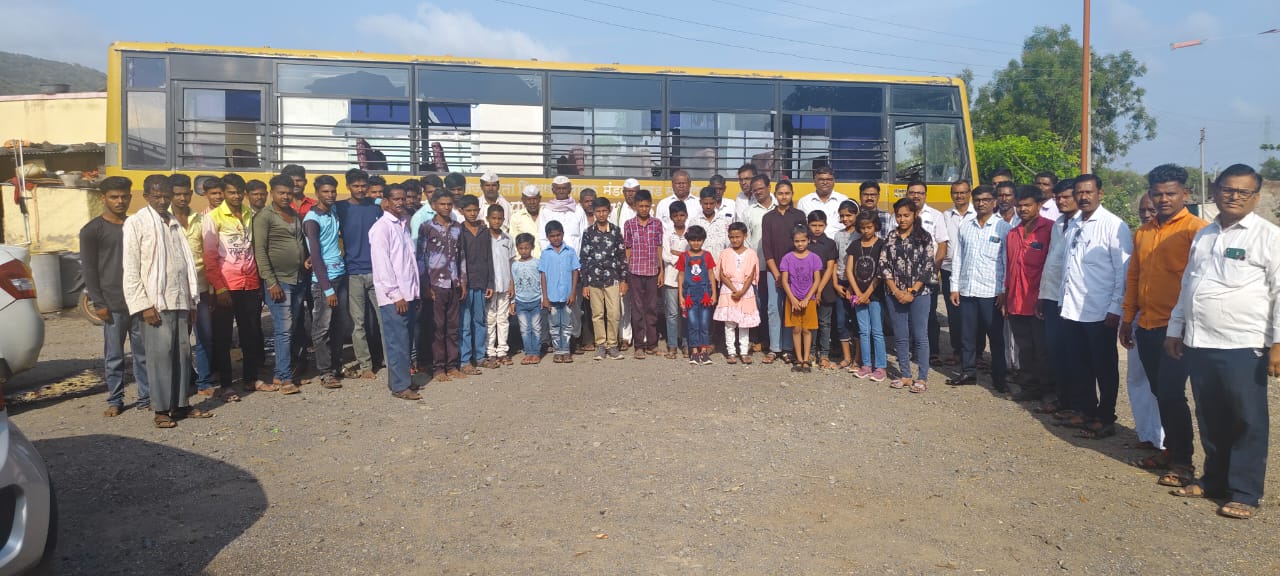
आम्ही मानतो की, प्रत्येक मूल त्याच्या भौगोलिक स्थितीवर अवलंबून न राहता दर्जेदार शिक्षण मिळवण्यास पात्र आहे. स्कूल व्हॅन उपलब्ध करून देण्याच्या आमच्या उपक्रमाला पाठिंबा देऊन दुर्गम आदिवासी भागात राहणाऱ्या वंचित विद्यार्थ्यांना आपण सक्षम बनविणार आहात.
स्कूल व्हॅनविना बदलत्या वातावरणाचा परिणाम विद्यार्थ्यांच्या शारीरिक परिस्थितीवर होतो. त्यांना नियमित उपस्थित राहणे पावसाळ्यात तेर अशक्य होते. मध्यम पाऊस पडला तर पायवाट असलेले रस्ते दुष्कर होऊन जातात. काही ठिकाणी तर चिखल 2 फुटवरून अधिक खोल असतो. आशा परिस्थितीतून विद्यार्थ्यांना शाळेत येणे अशक्य असते.
घरापासून शाळेचे अंतर किमान 3 कि.मी. आणि कमाल 7 कि. मी. पायी चालत येणाऱ्या ह्या विद्यार्थ्यांना आता आपल्या मदतीची गरज आहे.
भौगोलिक आव्हानांवर मात करणे
दुर्गम आदिवासी भागात राहणाऱ्या विद्यार्थ्यांसाठी, शाळेत जाणे हे एक कठीण आव्हान असू शकते. दळणवळणाच्या पायाभूत सुविधांचा अभाव आणि त्यात गुंतलेली विस्तीर्ण अंतरे अनेकदा त्यांच्या शिक्षणात अडथळा निर्माण करतात. स्कूल व्हॅन दान करून, आम्ही हे अंतर भरून काढू शकतो आणि वाहतुकीचे विश्वसनीय साधन प्रदान करू शकतो. या व्हॅन जीवनरेखा म्हणून काम करतात, ज्यामुळे विद्यार्थ्यांना शाळेत सुरक्षितपणे आणि कार्यक्षमतेने प्रवास करता येतो. शिक्षणात सुधारित प्रवेशासह, हे विद्यार्थी त्यांच्या पूर्ण क्षमतेचा ताबा मिळवू शकतात, गरिबीचे चक्र मोडून त्यांचे समुदाय सक्षम करू शकतात.
नियमित उपस्थिती सुनिश्चित करणे
शैक्षणिक यशासाठी नियमित शाळेत उपस्थिती महत्त्वाची आहे आणि विद्यार्थी वर्गांना सातत्याने उपस्थित राहू शकतील याची खात्री करण्यासाठी वाहतूक महत्त्वाची भूमिका बजावते. नियमित उपस्थिती शिकण्यात सातत्य वाढवते, विद्यार्थ्यांच्या सहभागास प्रोत्साहन देते आणि सुधारित शैक्षणिक यश आणि भविष्यातील संधींसाठी मार्ग मोकळा करते.
समुदाय सक्षमीकरण
स्कूल व्हॅन प्रदान करण्याचा परिणाम वैयक्तिक विद्यार्थ्यांच्या पलीकडे जातो. ते संपूर्ण समुदायापर्यंत विस्तारते, येणाऱ्या पिढ्यांना सक्षम करते. विद्यार्थ्यांना शिक्षणात प्रवेश करण्यास सक्षम करून, आम्ही संपूर्ण समाजाची उन्नती करतो, प्रगतीला चालना देतो आणि सामाजिक विकासाला चालना देतो. शिक्षण हे बदलासाठी उत्प्रेरक आहे आणि या व्हॅन्सद्वारे, आम्ही दुर्गम आदिवासी भागांना ज्ञानाच्या परिवर्तनीय शक्तीने सक्षम करतो, उज्ज्वल आणि अधिक समावेशक भविष्याचा पाया घालतो.
At Satyashodhak Mahila Vikas Mandal, we believe that every child deserves access to quality education, regardless of their geographical location. Join us in our mission to empower underprivileged students living in remote tribal areas by supporting our initiative to provide school vans. Your contribution can make a significant difference, enabling these students to overcome transportation barriers and embark on a journey of knowledge and opportunity.
Overcoming Geographic Challenges
For students living in remote tribal areas, attending school can be a daunting challenge. Lack of transportation infrastructure and the vast distances involved often hinder their access to education. By donating school vans, we can bridge this gap and provide a reliable means of transportation. These vans serve as a lifeline, enabling students to commute safely and efficiently to school. With improved access to education, these students can unlock their full potential, breaking the cycle of poverty and empowering their communities.
Ensuring Regular Attendance
Regular school attendance is crucial for academic success, and transportation plays a significant role in ensuring students can consistently attend classes. By providing school vans, we address one of the key barriers that prevent students from regularly attending school. With a reliable mode of transportation, students can overcome the challenges of distance and terrain, making it easier for them to be present in the classroom. Regular attendance fosters continuity in learning, encourages student engagement, and paves the way for improved academic achievements and future opportunities.
Community Empowerment
The impact of providing school vans goes beyond individual students. It extends to the entire community, empowering generations to come. By enabling students to access education, we uplift the community as a whole, promoting progress, and fostering social development. Education is a catalyst for change, and through these vans, we empower remote tribal areas with the transformative power of knowledge, laying the foundation for a brighter and more inclusive future.
Your support in donating for school vans can break the barriers that hinder underprivileged students from accessing education. Join us in empowering these students and transforming their lives.
Call to Action
Support Satyashodhak Mahila Vikas Mandal’s initiative by donating towards school vans. Together, let’s bridge the gap and empower underprivileged students in remote tribal areas to reach their full potential through education.
| Sr. No. | Donor details | Donation | Donation date |
|---|---|---|---|
| 1 | Mrs. Rucha Kapare & Ankit Agrawal | Rs. 4500/- | 30-Jan-24 |
| 2 | Mr. Osman Maqsood sir | Rs. 6000/- | 20-Feb-24 |
| 3 | Mr. Pravin Bhilegaonkar sir | Rs. 5000/- | 15-Jun-24 |
| 4 | Mr. Rahul Saykar sir | Rs. 500/- | 01-Jul-24 |
| 5 | Rucha Kapare Ma’am | Rs. 4000/- | 03-Jul-24 |
| 6 | Navnath Adhane sir | Rs. 2560/- | 4-Jul-24 |
| 7 | Mujeeb Fakira Patel sir | Rs. 3500/- | 4-Jul-24 |
| 8 | Dnyaneshwar Mote sir | Rs. 3500/- | 4-Jul-24 |
| 9 | Sunil Vasant Tidke Sir | Rs. 2480/- | 4-Jul-24 |
| 10 | Vivek Bagul sir | Rs. 1010/- | 4-Jul-24 |
| 11 | Suresh gaike sir | Rs. 3204/- | 4-Jul-24 |
| 12 | Chandrabhan pawar sir | Rs. 3500/- | 4-Jul-24 |
| 13 | Subhash Gaike sir | ₹1,900.00 | 5-Jul-24 |
| 14 | Babu Nema Rathod sir | ₹4,603.00 | 5-Jul-24 |
| 15 | Suresh Hiwarde sir | ₹3,500.00 | 5-Jul-24 |
| 16 | Sandeep Raskar sir | ₹300.00 | 5-Jul-24 |
| 17 | Prem rathod sir | ₹2,929.00 | 6-Jul-24 |
| 18 | Shrawan Awhale sir | ₹2,700.00 | 6-Jul-24 |
| 19 | Hiraman Gaikwad sir | ₹1,426.00 | 6-Jul-24 |
We are Charitable NGO recognized by Niti Ayog, Income Tax department of India and having 80G and CSR1 certificates.
All donations are received under this project will be transferred to school bus owner account against monthly invoice. Rs. 300 per student per month is agreed fare plan under Memorandum of understanding between school bus owner and tisgaon vidyalay management.
a live donation and beneficiary list is maintained to retain the transparency of donations received and projects conducted. we also post all projects on social media and any donor can contact to respective beneficiary on request.
– Yes. Under Section 80G, 50% of total donated amount is deducted from taxable amount.
e.g. Rs.1,00,000/- total donation amount
Rs. 50,000/- will be waived from taxable income amount.
i.e. Rs. 15,000/- tax waived off in case of 30% slab consideration.
For that donor need to submit PAN details after successful donation.
All necessary certifcates will be provided to donor over mail and whatsapp.
CLICK HERE 🔗 for submission of PAN CARD details for TAX BENEFIT.
Name : Satyashodhak Mahila Vikas Mandal
Account number: 519877744
Account Type : Current a/c
IFSC : IDIB000A035
Bank : Indian Bank, Samarth Nagar, CSN.
Total 100% donations are utilized for the purpose of project and transferred to transportation vendors.
All payment done through NEFT mode only.
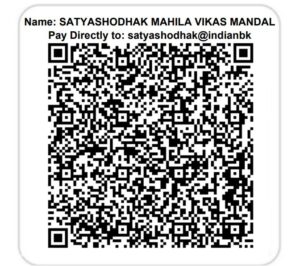
The Fastest and recommended payment method is UPI via scanning QR. No transaction charged deducted from donor account and 100% amount will be transferred to trust account.
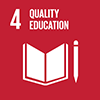
Target 4.1
By 2030, ensure that all girls and boys complete free, equitable and quality primary and secondary education leading to relevant and effective learning outcomes.
Indicators
4.1.1 Proportion of children and young people (a) in grades 2/3; (b) at the end of primary; and (c) at the end of lower secondary achieving at least a minimum proficiency level in (i) reading and (ii) mathematics, by sex
4.1.2 Completion rate (primary education, lower secondary education, upper secondary education)
Target 4.2
By 2030, ensure that all girls and boys have access to quality early childhood development, care and pre-primary education so that they are ready for primary education
Indicators
4.2.1 Proportion of children aged 24–59 months who are developmentally on track in health, learning and psychosocial well-being, by sex
4.2.2 Participation rate in organized learning (one year before the official primary entry age), by sex
Target 4.a
Build and upgrade education facilities that are child, disability and gender sensitive and provide safe, non-violent, inclusive and effective learning environments for all